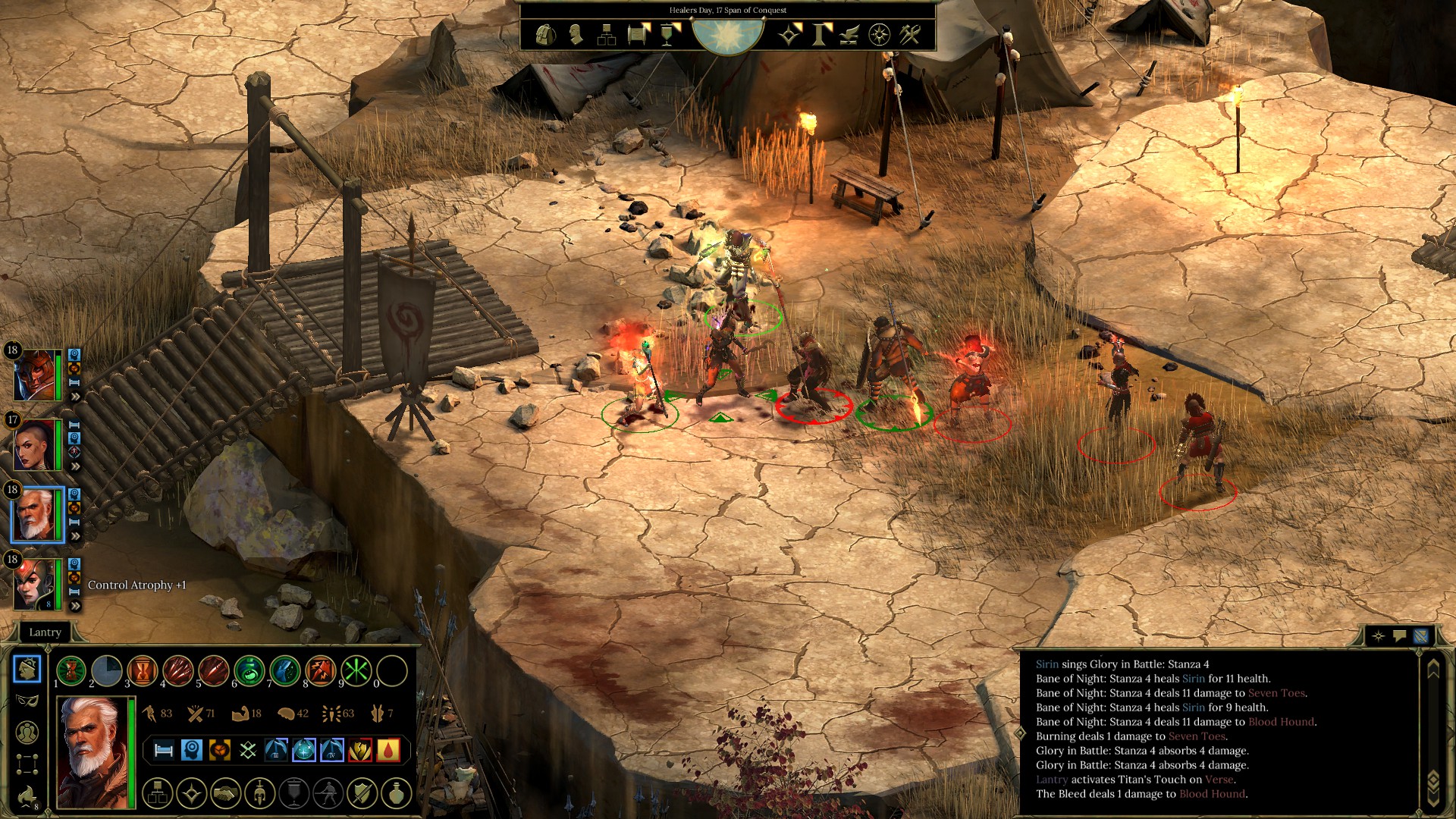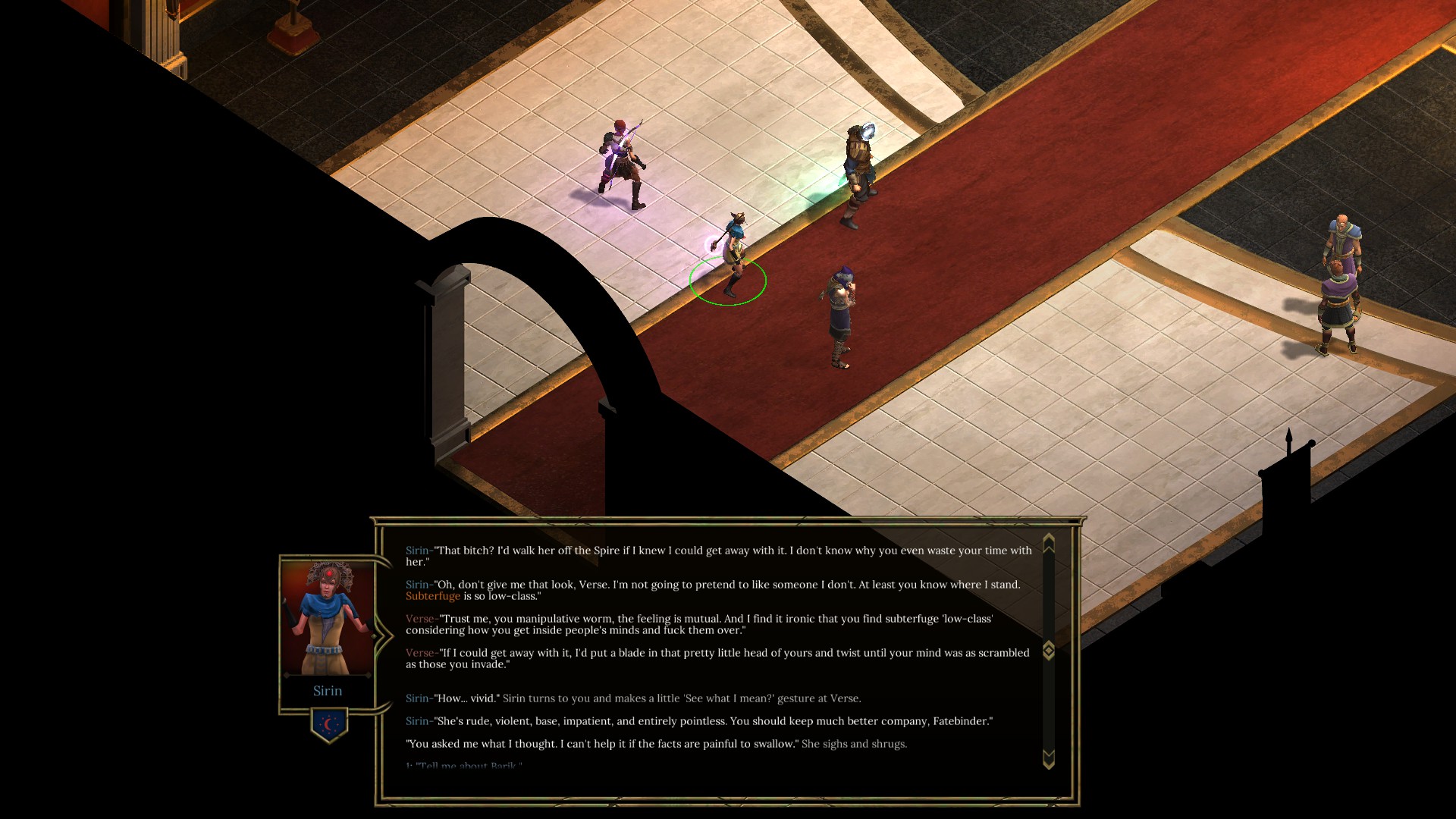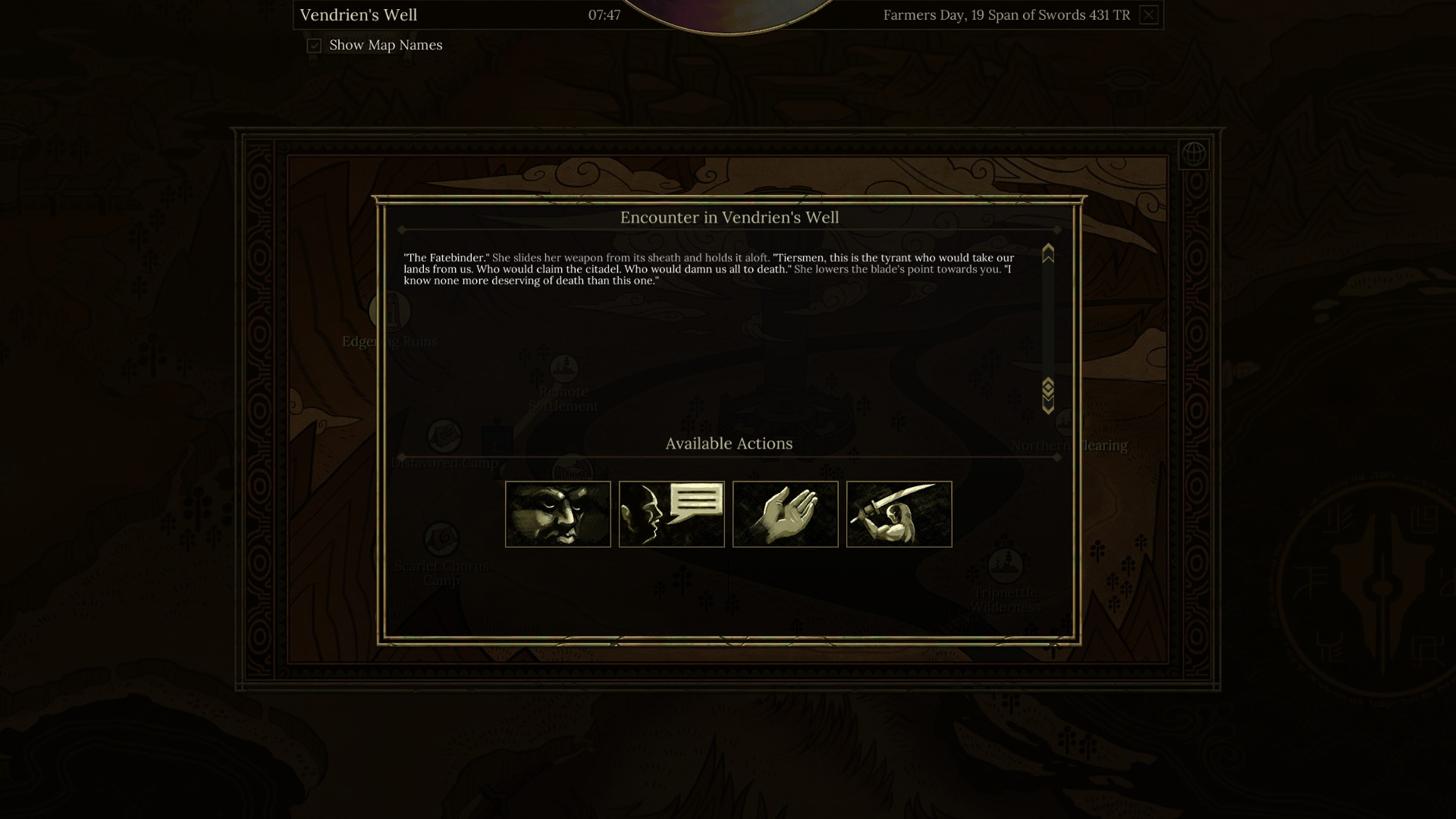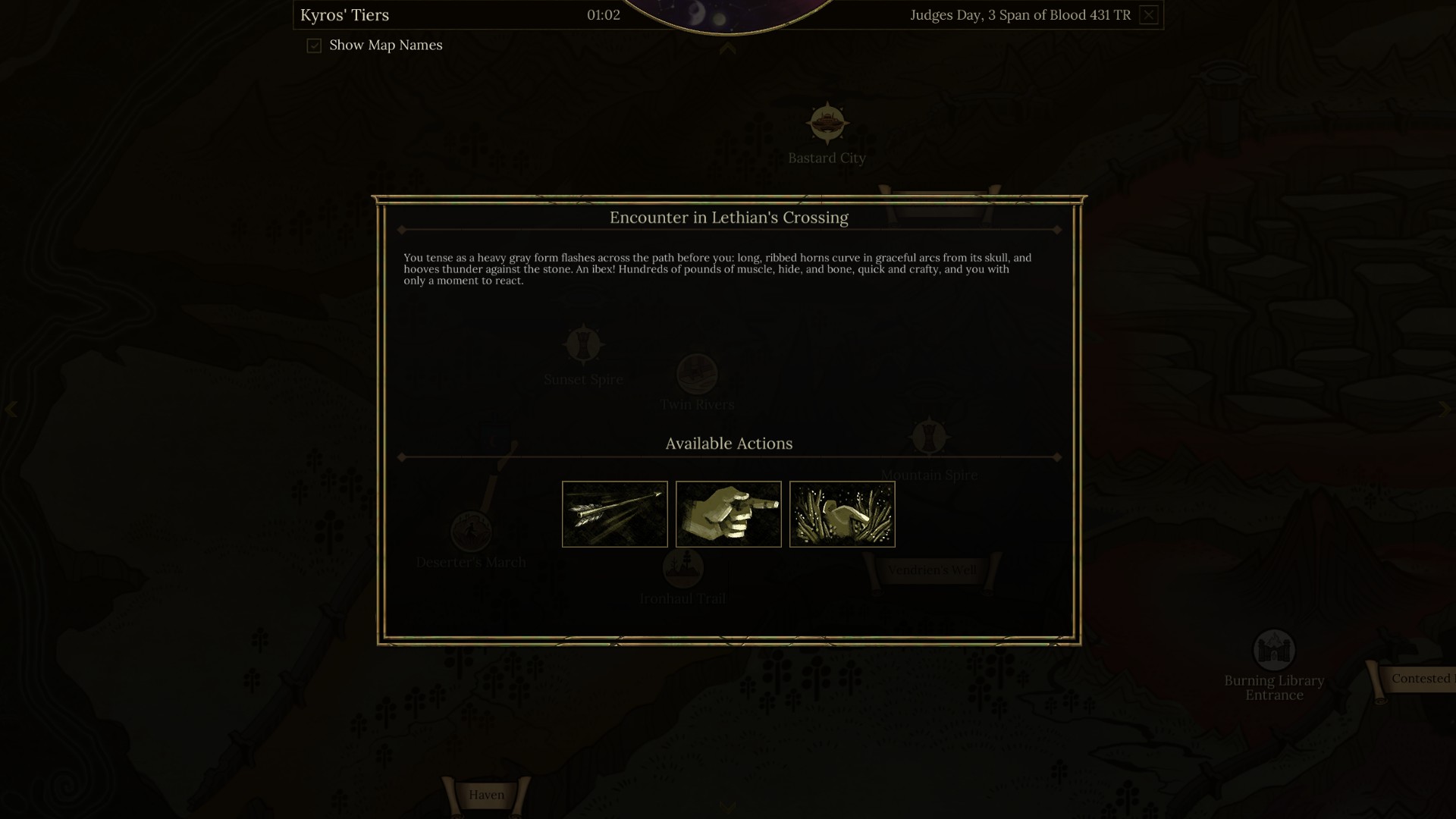Over half a year since release, the RPG from Obsidian has gotten several large patches with free content as well as DLC. I was interested in seeing what had changed and how the game stacked up through multiple playthroughs. Here are my updated thoughts after playing many hours more with the DLC.
Note: Key provided by the publisher, some potential spoilers are included in article.
Tyranny [Official Site] was one of the more interesting releases of last year. It’s set in a world where what would normally be the clear antagonist in most other RPGs, the Overlord Kyros, has conquered most of the known world. The player is an agent of Kyros, a fatebinder, subservient to one of the powerful Archons that Kyros has tasked with bringing order to the Tiers, the last part of the world yet to be fully conquered. The game is about the conquest and its aftermath as well as the alliances that must be made or broken with different factions.
In our review last year, Liam and I had wildly diverging experiences with the game’s plot. Tyranny is a game that’s designed to play out rather differently depending on the choices the player makes at the beginning of the game as well as during each chapter. How the player chooses to interpret and execute Kyros’ law changes not only how factions and characters react but also how the world itself is affected. Whole areas of the game may be changed or made inaccessible depending on what players do.
Before launch, developer diaries emphasized that Tyranny was a game meant to be replayed multiple times and seen from different perspective. Its brisk length (for a CRPG) of 20-30 hours for a single go reflects that design philosophy. The patch a month ago added an option of starting a new game+, carrying over stats and experience for characters as well as choice items and conquest decisions (if so desired). This makes it much easier for players who have completed the game already to jump back in and see how altering choices can lead to different outcomes. Unfortunately, the new game+ option causes enemies to autolevel with you, making the combat about as challenging as the first time around.

This isn’t to say that the combat in Tyranny is bad. Far from it. As noted in our initial review, combo powers and faction abilities are interesting and larger-than-life twists that spice up combat. And the magic system is elegant and very fun to play with. Patches since launch have tweaked, partially overhauled and generally improved the system, making a wide array of builds viable. That said, how much you enjoy it has to do with personal tastes—RPG games can be on a wide spectrum with combat being more tactical-like, as in the Shadowrun games by Harebrained Schemes, or more simplified or even an auxiliary and entirely avoidable part of the experience like in Tides of Numenera—and different players prefer one style over another. I was fine with Tyranny's more or less standard system; the party AI does a good job if you don't want to micromanage much. The main reason I lowered the difficulty is because I wanted to experience the story again as quickly as possible.
The world of Tyranny is filled with factions. Both of the Overlord’s armies sent to conquer the Tiers, The Scarlet Chorus and The Disfavored, are examples but would-be enemies and major settlements as well as some characters also have their own factions. During the course of the game the player’s actions may change the level of wrath or favor of each faction, leading to different dialog and events. Persuading NPCs of a faction to trust you or yield often depend on your standings. Who you anger and who you ally with makes events in each chapter of the game play out differently—you may find that spurning the two armies and their Archons may lead them to take hostile actions against places and factions under your protection.
One of the main quests of the game involves figuring out who is to blame for the slow conquest of the Tiers and assigning the blame for who is to be held accountable for allowing the resistance against Kyros to solidify. In my original playthrough, I decided that neither the honor-bound Disfavored or the chaotic Scarlet Chorus had done a good job, with both leading Archons bickering like children. Through my positive actions towards my erstwhile enemy, I curried enough favor to get them to meet with me (this was something Liam didn’t even realize was possible when playing). Once met, they proposed a desperate plan to avoid being crushed by either Archon, with me taking them under my wing as vassals. This naturally put me at odds with both Archons but it fulfilled Kyros’ will and edict that one of her subjects must claim the holding under siege by the armies. This led to the formation of a coalition against these armies and, for the rest of the game, I spent most my time fighting what would nominally be my fellow followers of Kyros, rallying others to my cause.
I roleplayed as a loyal agent making the best of a bad situation, disdainful of incompetence. If I had wanted, I could have picked choices more in line with being a power-hungry upstart instead and screwed over everyone This is where Tyranny works best: the feeling of player agency is great. You can justify the choices you make along your own lines of logic and often just run with them. If you want to ally the Disfavored, for example, you can and the subsequent parts of the game play out rather differently as your antagonistic forces change accordingly. Even within these broad routes (for lack of a better term) you have significant leeway in deciding where to go and whomever else you choose to recruit.
My first replay with new game+ saw me adopt pretty much the same basic strategy as before. The main difference was that my choices during the initial conquest phase were purposefully different. I visited alternative places with Kyros’ armies and solved dilemmas in a different fashion. This meant that the locations I visited later on, such as the Burning Library, were sometimes places that I hadn’t visited at all in my previous session. The NPCs and factions I interacted with reacted differently and came into the story at other points, as well. I still ended up antagonizing most of Kyros’ forces save for a select few but my allies at the end were a whole new group and the parts of the world where I didn’t spend much time in developed along another path.

For a playthrough after that, I tried something new again, allying myself with one of Kyros’ armies. As you can probably imagine that also played out in a different fashion and the quests I got reflected the choices I made rather well. This isn’t to say that I couldn’t tell where the game was scripted to diverge and contribute to that illusion to freedom—as a veteran CRPG player I could tell where things branched or were forced and why. My point is that this illusion is well done and the writing does a good job of making the player feel central to all that is going on in the world. In that sense, Tyranny is a game well worth replaying, since the changed perspectives and information you get in various playthroughs add to the overall storytelling experience.
This isn’t to say that all is roses. It may be because the game is engaging that the parts that are less-than-perfect stand out so clearly. The biggest example is with companion NPCs. You can instill fear and loyalty in them, mirroring the wrath and favor of factions, but your actual direct interactions with them feel limited. If they’re in your party, the will occasionally opine and react to conversations and situations but it’s altogether too rare for my tastes. There is little difference between the conversations you can have at the beginning of the game and at the end. They may occasionally have a line or two depending on a milestone you’ve achieved, but it’s really not much reward. This is a complaint that I’ll admit is a bit nit-picky but, given how the game is otherwise successful at making you feel at the center of the changes in the setting, it feels somewhat underwritten and underdeveloped by contrast.
This is most obvious when comparing it to other similar RPGs. Things like companion quests are bog standard in many games. Tyranny even baits the player with storytelling threads if you care to talk to your party members; things like Verse’s unsettling ability, Barik’s armor and Sirin’s helmet are clear hooks. Yet there’s nothing to be done about any of that despite the (supposed) importance to the character’s identity and thinking. I’m not saying that everything has to be neatly resolved, far from it. All that matters is the attempt. Exploring the things your companions care about is side quest 101, insofar as game design is concerned. It was something that Pillars of Eternity (also made by Obsidian) handled properly so I have to wonder if this was a time or budget limitation. It’s just mind-boggling how potential enemies and rivals feel like they have more meaningful interactions with the player than the companion that’s by your side for most of the game.

Another complaint I have with the game is how underwhelming its conclusion is. Without getting into specific spoilers, the ending leaves things very open and some things unresolved. You get an ending screen which explains what happened to each location, faction and companion, but it’s not really closure. It’s clearly the setup for a sequel or an expansion as it leaves a lot of questions unanswered. Multiple playthroughs hint that Kyros has a direct interest in the player and, to a certain degree, fomented much of the conflict that the player is tasked with resolving. With plenty of theories and mysteries, it leaves the player hungry for more. Once again, I’m not sure whether it was the realities of a limited budget or a conscious decision, but the last act of the game feels like it could have done with a good deal more fleshing out of content. In that sense, the game is a bit of a tease, and leaves much to the imagination.
This is a good opportunity to segue here into a few other things in the game that aren’t completely solid either. The stronghold/base development only reaches its full potential in the last act of the game, when travel times are nearly non-existent, making time-elapsed-based crafting pointless. Not to mention that the unique items you can get aren’t really helpful as you’re likely already powerful enough to deal with the handful of encounters you can potentially have. There’s also a distinct lack of hubs or major settlements where you can reliably check back for more quests and happenings. I would have liked to have an area that you can access every act that’s not your base and that changes depending on what’s happened in the world. I thought that the Bastard City would be such a place since it’s apart most of the areas you’re saving/destroying but it’s just there for one or two main quests. Sure, you may be thinking, these sound like minor complaints, but it’s my view that having a few truly memorable places which are kept fresh through the whole game makes the experience more exciting.
Finally, this brings us to the topic of the DLC. The first DLC pack was for portraits and wholly cosmetic. I was given access to the second DLC, called Tales from the Tiers, which promises new events while traveling and ways to affect opinions from companions and factions. In practice this means that as you travel from area to area, there is a chance of getting a little pop up window where something happens. You’re presented with choices that, depending on your stats and current companions, can vary. The events themselves can range from encountering a crazy man on the road to finding a cache of weapons in a blighted landscape to setting policy on how to deal with enemy sighting in your territory. The decisions you make, like with the ones you make during dialog, can lead to loot, people and factions liking you more or less or even combat encounters.

For the most part, these events aren’t bad at all. They add to what would otherwise be the dull affair of watching the little icon for your party traveling between locations. But, they certainly don’t revolutionize the game. I haven’t seen them all, since they vary by the region you’re in and have a random factor, but I’ve seen enough to say that they don’t really have a meaningful impact on gameplay. They’re nice little distractions but don’t add anything that I’d consider close to essential for enjoying the game. You get a slightly enhanced feeling of atmosphere but it’s not enough to justify it being a separate product. In my opinion, this is the sort of thing best bundled with other content such as new quests or locations to explore.
I could gas on and on about Tyranny and my experiences playing. It’s a refreshing setting and a very competent execution of a genre that can be very conservative at times. It’s unfortunate that the game was marketed so heavily as a game where “evil has won”, since that’s not really what the game is about at all. It’s a game where justice and morality are things that are not only in flux according to whomever you’re dealing with but also something that you can interpret according to the agenda you’re pushing. You can be good and wholesome within the confines of the situations presented but you can also be ruthless and despicable. The freedom of choice isn’t the real triumph there, plenty of games do that, but rather it’s how the game integrates the consequences of these choices into the plot and dialog. Playing “the bad guy” is something of a needless novelty, but being able to define law and justice as a fatebinder is something that’s closer to a whole colorful spectrum than just shades of gray. My complaining about specific shortcomings in this article shouldn't put off fans of RPG games, as the several dozen hours I put in during multiple games were mostly great.
I can only hope that the upcoming DLC, Bastard’s Wound, does bring some of the closure that I feel is lacking from the base game. It promises a new location and companion quests for a few of the companions, which may go some way in addressing my complaints. More importantly, the patch that’ll arrive with this DLC will also include more of everything; new voice acting, expanded content in the third act of the game and a new ending are expected. We’ll see how it all turns out, since Tyranny has proven to be one of the more interesting RPG experiences I’ve had in recent years.
Note: Key provided by the publisher, some potential spoilers are included in article.
Tyranny [Official Site] was one of the more interesting releases of last year. It’s set in a world where what would normally be the clear antagonist in most other RPGs, the Overlord Kyros, has conquered most of the known world. The player is an agent of Kyros, a fatebinder, subservient to one of the powerful Archons that Kyros has tasked with bringing order to the Tiers, the last part of the world yet to be fully conquered. The game is about the conquest and its aftermath as well as the alliances that must be made or broken with different factions.
In our review last year, Liam and I had wildly diverging experiences with the game’s plot. Tyranny is a game that’s designed to play out rather differently depending on the choices the player makes at the beginning of the game as well as during each chapter. How the player chooses to interpret and execute Kyros’ law changes not only how factions and characters react but also how the world itself is affected. Whole areas of the game may be changed or made inaccessible depending on what players do.
Before launch, developer diaries emphasized that Tyranny was a game meant to be replayed multiple times and seen from different perspective. Its brisk length (for a CRPG) of 20-30 hours for a single go reflects that design philosophy. The patch a month ago added an option of starting a new game+, carrying over stats and experience for characters as well as choice items and conquest decisions (if so desired). This makes it much easier for players who have completed the game already to jump back in and see how altering choices can lead to different outcomes. Unfortunately, the new game+ option causes enemies to autolevel with you, making the combat about as challenging as the first time around.

This isn’t to say that the combat in Tyranny is bad. Far from it. As noted in our initial review, combo powers and faction abilities are interesting and larger-than-life twists that spice up combat. And the magic system is elegant and very fun to play with. Patches since launch have tweaked, partially overhauled and generally improved the system, making a wide array of builds viable. That said, how much you enjoy it has to do with personal tastes—RPG games can be on a wide spectrum with combat being more tactical-like, as in the Shadowrun games by Harebrained Schemes, or more simplified or even an auxiliary and entirely avoidable part of the experience like in Tides of Numenera—and different players prefer one style over another. I was fine with Tyranny's more or less standard system; the party AI does a good job if you don't want to micromanage much. The main reason I lowered the difficulty is because I wanted to experience the story again as quickly as possible.
The world of Tyranny is filled with factions. Both of the Overlord’s armies sent to conquer the Tiers, The Scarlet Chorus and The Disfavored, are examples but would-be enemies and major settlements as well as some characters also have their own factions. During the course of the game the player’s actions may change the level of wrath or favor of each faction, leading to different dialog and events. Persuading NPCs of a faction to trust you or yield often depend on your standings. Who you anger and who you ally with makes events in each chapter of the game play out differently—you may find that spurning the two armies and their Archons may lead them to take hostile actions against places and factions under your protection.
One of the main quests of the game involves figuring out who is to blame for the slow conquest of the Tiers and assigning the blame for who is to be held accountable for allowing the resistance against Kyros to solidify. In my original playthrough, I decided that neither the honor-bound Disfavored or the chaotic Scarlet Chorus had done a good job, with both leading Archons bickering like children. Through my positive actions towards my erstwhile enemy, I curried enough favor to get them to meet with me (this was something Liam didn’t even realize was possible when playing). Once met, they proposed a desperate plan to avoid being crushed by either Archon, with me taking them under my wing as vassals. This naturally put me at odds with both Archons but it fulfilled Kyros’ will and edict that one of her subjects must claim the holding under siege by the armies. This led to the formation of a coalition against these armies and, for the rest of the game, I spent most my time fighting what would nominally be my fellow followers of Kyros, rallying others to my cause.
I roleplayed as a loyal agent making the best of a bad situation, disdainful of incompetence. If I had wanted, I could have picked choices more in line with being a power-hungry upstart instead and screwed over everyone This is where Tyranny works best: the feeling of player agency is great. You can justify the choices you make along your own lines of logic and often just run with them. If you want to ally the Disfavored, for example, you can and the subsequent parts of the game play out rather differently as your antagonistic forces change accordingly. Even within these broad routes (for lack of a better term) you have significant leeway in deciding where to go and whomever else you choose to recruit.
My first replay with new game+ saw me adopt pretty much the same basic strategy as before. The main difference was that my choices during the initial conquest phase were purposefully different. I visited alternative places with Kyros’ armies and solved dilemmas in a different fashion. This meant that the locations I visited later on, such as the Burning Library, were sometimes places that I hadn’t visited at all in my previous session. The NPCs and factions I interacted with reacted differently and came into the story at other points, as well. I still ended up antagonizing most of Kyros’ forces save for a select few but my allies at the end were a whole new group and the parts of the world where I didn’t spend much time in developed along another path.

For a playthrough after that, I tried something new again, allying myself with one of Kyros’ armies. As you can probably imagine that also played out in a different fashion and the quests I got reflected the choices I made rather well. This isn’t to say that I couldn’t tell where the game was scripted to diverge and contribute to that illusion to freedom—as a veteran CRPG player I could tell where things branched or were forced and why. My point is that this illusion is well done and the writing does a good job of making the player feel central to all that is going on in the world. In that sense, Tyranny is a game well worth replaying, since the changed perspectives and information you get in various playthroughs add to the overall storytelling experience.
This isn’t to say that all is roses. It may be because the game is engaging that the parts that are less-than-perfect stand out so clearly. The biggest example is with companion NPCs. You can instill fear and loyalty in them, mirroring the wrath and favor of factions, but your actual direct interactions with them feel limited. If they’re in your party, the will occasionally opine and react to conversations and situations but it’s altogether too rare for my tastes. There is little difference between the conversations you can have at the beginning of the game and at the end. They may occasionally have a line or two depending on a milestone you’ve achieved, but it’s really not much reward. This is a complaint that I’ll admit is a bit nit-picky but, given how the game is otherwise successful at making you feel at the center of the changes in the setting, it feels somewhat underwritten and underdeveloped by contrast.
This is most obvious when comparing it to other similar RPGs. Things like companion quests are bog standard in many games. Tyranny even baits the player with storytelling threads if you care to talk to your party members; things like Verse’s unsettling ability, Barik’s armor and Sirin’s helmet are clear hooks. Yet there’s nothing to be done about any of that despite the (supposed) importance to the character’s identity and thinking. I’m not saying that everything has to be neatly resolved, far from it. All that matters is the attempt. Exploring the things your companions care about is side quest 101, insofar as game design is concerned. It was something that Pillars of Eternity (also made by Obsidian) handled properly so I have to wonder if this was a time or budget limitation. It’s just mind-boggling how potential enemies and rivals feel like they have more meaningful interactions with the player than the companion that’s by your side for most of the game.

Another complaint I have with the game is how underwhelming its conclusion is. Without getting into specific spoilers, the ending leaves things very open and some things unresolved. You get an ending screen which explains what happened to each location, faction and companion, but it’s not really closure. It’s clearly the setup for a sequel or an expansion as it leaves a lot of questions unanswered. Multiple playthroughs hint that Kyros has a direct interest in the player and, to a certain degree, fomented much of the conflict that the player is tasked with resolving. With plenty of theories and mysteries, it leaves the player hungry for more. Once again, I’m not sure whether it was the realities of a limited budget or a conscious decision, but the last act of the game feels like it could have done with a good deal more fleshing out of content. In that sense, the game is a bit of a tease, and leaves much to the imagination.
This is a good opportunity to segue here into a few other things in the game that aren’t completely solid either. The stronghold/base development only reaches its full potential in the last act of the game, when travel times are nearly non-existent, making time-elapsed-based crafting pointless. Not to mention that the unique items you can get aren’t really helpful as you’re likely already powerful enough to deal with the handful of encounters you can potentially have. There’s also a distinct lack of hubs or major settlements where you can reliably check back for more quests and happenings. I would have liked to have an area that you can access every act that’s not your base and that changes depending on what’s happened in the world. I thought that the Bastard City would be such a place since it’s apart most of the areas you’re saving/destroying but it’s just there for one or two main quests. Sure, you may be thinking, these sound like minor complaints, but it’s my view that having a few truly memorable places which are kept fresh through the whole game makes the experience more exciting.
Finally, this brings us to the topic of the DLC. The first DLC pack was for portraits and wholly cosmetic. I was given access to the second DLC, called Tales from the Tiers, which promises new events while traveling and ways to affect opinions from companions and factions. In practice this means that as you travel from area to area, there is a chance of getting a little pop up window where something happens. You’re presented with choices that, depending on your stats and current companions, can vary. The events themselves can range from encountering a crazy man on the road to finding a cache of weapons in a blighted landscape to setting policy on how to deal with enemy sighting in your territory. The decisions you make, like with the ones you make during dialog, can lead to loot, people and factions liking you more or less or even combat encounters.

For the most part, these events aren’t bad at all. They add to what would otherwise be the dull affair of watching the little icon for your party traveling between locations. But, they certainly don’t revolutionize the game. I haven’t seen them all, since they vary by the region you’re in and have a random factor, but I’ve seen enough to say that they don’t really have a meaningful impact on gameplay. They’re nice little distractions but don’t add anything that I’d consider close to essential for enjoying the game. You get a slightly enhanced feeling of atmosphere but it’s not enough to justify it being a separate product. In my opinion, this is the sort of thing best bundled with other content such as new quests or locations to explore.
I could gas on and on about Tyranny and my experiences playing. It’s a refreshing setting and a very competent execution of a genre that can be very conservative at times. It’s unfortunate that the game was marketed so heavily as a game where “evil has won”, since that’s not really what the game is about at all. It’s a game where justice and morality are things that are not only in flux according to whomever you’re dealing with but also something that you can interpret according to the agenda you’re pushing. You can be good and wholesome within the confines of the situations presented but you can also be ruthless and despicable. The freedom of choice isn’t the real triumph there, plenty of games do that, but rather it’s how the game integrates the consequences of these choices into the plot and dialog. Playing “the bad guy” is something of a needless novelty, but being able to define law and justice as a fatebinder is something that’s closer to a whole colorful spectrum than just shades of gray. My complaining about specific shortcomings in this article shouldn't put off fans of RPG games, as the several dozen hours I put in during multiple games were mostly great.
I can only hope that the upcoming DLC, Bastard’s Wound, does bring some of the closure that I feel is lacking from the base game. It promises a new location and companion quests for a few of the companions, which may go some way in addressing my complaints. More importantly, the patch that’ll arrive with this DLC will also include more of everything; new voice acting, expanded content in the third act of the game and a new ending are expected. We’ll see how it all turns out, since Tyranny has proven to be one of the more interesting RPG experiences I’ve had in recent years.
Some you may have missed, popular articles from the last month:
All posts need to follow our rules. For users logged in: please hit the Report Flag icon on any post that breaks the rules or contains illegal / harmful content. Guest readers can email us for any issues.
Do you regret doing multiple playthroughs before the denouement DLC is released? Will you be able to go back to your cache of old saves and complete the DLC with your various characters? I'm really tempted by this game, but feel I should delay until the complete experience has been released...
0 Likes
Been thinking about buying the game for a longer time now. I'll be waiting for the upcoming patch/DLC now, too. Thank you very much for your elaborate article, BTRE! <3
0 Likes
I'm holding off until Bastard's Wound comes out to do a second playthrough.
0 Likes
Do you regret doing multiple playthroughs before the denouement DLC is released? Will you be able to go back to your cache of old saves and complete the DLC with your various characters? I'm really tempted by this game, but feel I should delay until the complete experience has been released...Regret? Nah. If I'm brutally honest I would have normally waited until more story content dropped to play again but the opportunity to cover the Tales from the Tiers came up and, well, figured I might as well make the most of the chance since Bastard's Wound has no release date. A few months from now I think I'll be able to stomach another go from scratch, if necessary. But I doubt it'll come to that. The game saves per character and there's plenty of saves, so I could be cheeky and load something up, depending on what the new content actually does and when in the game it kicks in.
Not to sound too pessimistic but, going by the press release, I don't think Bastard's Wound will be that big of an expansion or will fundamentally alter the basic structure of the game. But would love to be proven wrong and see the storytelling complaints addressed.
Been thinking about buying the game for a longer time now. I'll be waiting for the upcoming patch/DLC now, too. Thank you very much for your elaborate article, BTRE! <3Thanks, I tried not to drone on too much since it's easy to get lost in nitpicks and could have easily written a few thousand words more dissecting every system :P
1 Likes, Who?
Im not too interested in the game, but that was a great Review BTRE.
1 Likes, Who?
The ending is very sudden. It made me think, "wait, is that it?". It felt like the game just stopped instead of actually ending.
I will give it a 2nd run once the expansions arrive.
Last edited by Aryvandaar on 17 Jul 2017 at 7:52 am UTC
I will give it a 2nd run once the expansions arrive.
Last edited by Aryvandaar on 17 Jul 2017 at 7:52 am UTC
0 Likes







 How to install GE-Proton on Steam Deck, SteamOS, Linux
How to install GE-Proton on Steam Deck, SteamOS, Linux An idiots guide to setting up Minecraft on Steam Deck / SteamOS with controller support
An idiots guide to setting up Minecraft on Steam Deck / SteamOS with controller support
Oh and the name doesn't mean anything but coincidentally could be pronounced as "Buttery" which suits me just fine.
See more from me